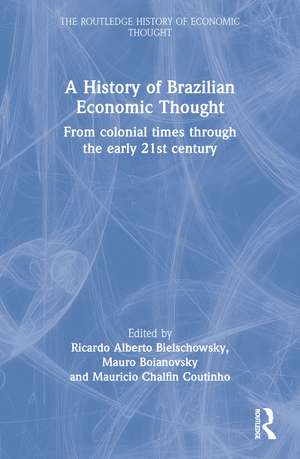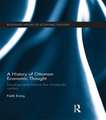A History of Brazilian Economic Thought: From Colonial Times Through The Early 21st Century: The Routledge History of Economic Thought
Editat de Ricardo Bielschowsky, Mauro Boianovsky, Mauricio Chalfin Coutinhoen Limba Engleză Paperback – 7 oct 2024
After an editorial introduction, it opens with a discussion of the issue of the historical limits to and circumstances of the production of pure economic theory by Brazilian economists. The proceeding chapters follow the classical periodization of Brazilian economic history, starting with the colonial economy (up until the early 19th century) and the transition into an economy independent from Portugal (1808 through the 1830s) when formal independence took place in 1822. The third part deals with the "coffee era" (1840s to 1930s). The last part covers the "developmentalist" and "globalization" eras (1930–2010).
This book is ideal for international and national scholars in social sciences, students in both undergraduate and graduate courses in economics, and any individuals interested in Brazilian economic and intellectual history.
| Toate formatele și edițiile | Preț | Express |
|---|---|---|
| Paperback (1) | 260.81 lei 6-8 săpt. | |
| Taylor & Francis – 7 oct 2024 | 260.81 lei 6-8 săpt. | |
| Hardback (1) | 898.33 lei 6-8 săpt. | |
| Taylor & Francis – 22 dec 2022 | 898.33 lei 6-8 săpt. |
Preț: 260.81 lei
Preț vechi: 311.85 lei
-16% Nou
Puncte Express: 391
Preț estimativ în valută:
49.90€ • 52.25$ • 41.29£
49.90€ • 52.25$ • 41.29£
Carte tipărită la comandă
Livrare economică 07-21 aprilie
Preluare comenzi: 021 569.72.76
Specificații
ISBN-13: 9781032029313
ISBN-10: 1032029315
Pagini: 268
Ilustrații: 2
Dimensiuni: 156 x 234 mm
Greutate: 0.49 kg
Ediția:1
Editura: Taylor & Francis
Colecția Routledge
Seria The Routledge History of Economic Thought
Locul publicării:Oxford, United Kingdom
ISBN-10: 1032029315
Pagini: 268
Ilustrații: 2
Dimensiuni: 156 x 234 mm
Greutate: 0.49 kg
Ediția:1
Editura: Taylor & Francis
Colecția Routledge
Seria The Routledge History of Economic Thought
Locul publicării:Oxford, United Kingdom
Public țintă
Academic, Postgraduate, and UndergraduateCuprins
1. Editorial Introduction
Part 1: Contributions to economic theory
2. Contributions to economics from the "periphery" in historical perspective: the case of Brazil after mid-20th century
Mauro Boianovsky.
Part 2: Colonial and early post-colonial periods
3. Sugar, Slaves and Gold: the Political Economy of the Portuguese Colonial Empire in the 17th and 18th Centuries
José Luís Cardoso
4. "The transition to post-colonial economy"
Mauricio C. Coutinho
Part 3: The "coffee era"
5. Economic ideas about slavery and free labor in the 19th century
Amaury Patrick Gremaud and Renato Leite Marcondes
6. Debating Money in Brazil, 1850s to 1930
André A. Villela
7. Industrial development and government protection: issues and controversies, circa 1840–1930
Flávio Rabelo Versiani
Part 4: The "developmentalist" and the "globalization" eras
8. Brazilian economic thought in the "developmentalist era": 1930-1980
Ricardo Bielschowsky and Carlos Mussi
9. The end of developmentalism, the globalization era
and the concern with income distribution (1981-2010)
Eduardo F. Bastian and Carlos Pinkusfeld Bastos
Part 1: Contributions to economic theory
2. Contributions to economics from the "periphery" in historical perspective: the case of Brazil after mid-20th century
Mauro Boianovsky.
Part 2: Colonial and early post-colonial periods
3. Sugar, Slaves and Gold: the Political Economy of the Portuguese Colonial Empire in the 17th and 18th Centuries
José Luís Cardoso
4. "The transition to post-colonial economy"
Mauricio C. Coutinho
Part 3: The "coffee era"
5. Economic ideas about slavery and free labor in the 19th century
Amaury Patrick Gremaud and Renato Leite Marcondes
6. Debating Money in Brazil, 1850s to 1930
André A. Villela
7. Industrial development and government protection: issues and controversies, circa 1840–1930
Flávio Rabelo Versiani
Part 4: The "developmentalist" and the "globalization" eras
8. Brazilian economic thought in the "developmentalist era": 1930-1980
Ricardo Bielschowsky and Carlos Mussi
9. The end of developmentalism, the globalization era
and the concern with income distribution (1981-2010)
Eduardo F. Bastian and Carlos Pinkusfeld Bastos
Notă biografică
Ricardo Bielschowsky is full professor of economics at Universidade Federal do Rio de Janeiro, Brazil.
Mauro Boianovsky is full professor of economics at Universidade de Brasília, Brazil.
Mauricio C. Coutinho is full professor of economics at Universidade de Campinas, Brazil.
Mauro Boianovsky is full professor of economics at Universidade de Brasília, Brazil.
Mauricio C. Coutinho is full professor of economics at Universidade de Campinas, Brazil.
Recenzii
"This is a more than welcome initiative, filling a long-standing gap in the English language on the evolution of economic ideas in the largest and most populous country of South America."
Rogério Arthmar, History of Economic Ideas
Rogério Arthmar, History of Economic Ideas
Descriere
This book provides a comprehensive analysis of the evolution of Brazilian economic thought ranging from colonial times through to the early 21st Century.
















